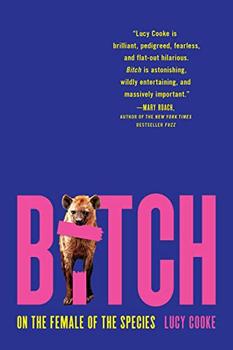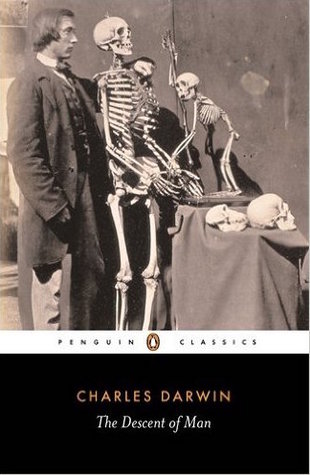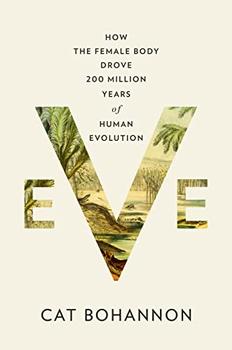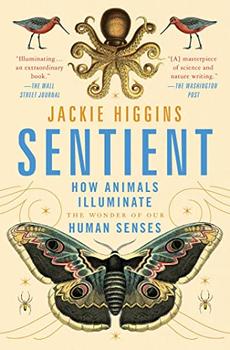Summary | Excerpt | Reviews | Beyond the book | Read-Alikes | Genres & Themes | Author Bio

On the Female of the Species
by Lucy CookeA fierce, funny, and revolutionary look at the queens of the animal kingdom.
Studying zoology made Lucy Cooke feel like a sad freak. Not because she loved spiders or would root around in animal feces: all her friends shared the same curious kinks. The problem was her sex. Being female meant she was, by nature, a loser.
Since Charles Darwin, evolutionary biologists have been convinced that the males of the animal kingdom are the interesting ones—dominating and promiscuous, while females are dull, passive, and devoted.
In Bitch, Cooke tells a new story. Whether investigating same-sex female albatross couples that raise chicks, murderous mother meerkats, or the titanic battle of the sexes waged by ducks, Cooke shows us a new evolutionary biology, one where females can be as dynamic as any male. This isn't your grandfather's evolutionary biology. It's more inclusive, truer to life, and, simply, more fun.
AUTHOR'S NOTE ON LANGUAGE
Language evolves rapidly, and there is currently much conversation about the conflation of sex and gender terms. It is critical to use these terms appropriately and not to confuse them. Most scientists agree that non-human animals do not have gender. In this book, the terms female and male refer to an animal's biological sex. I do engage in anthropomorphizing, to an extent. Sometimes this is because these were the historical terms used. For example, I may refer to an animal's genitalia as being 'masculinized' or a brain being 'feminized' as this was the original scientific description. Such gendered terms needn't and shouldn't be used to describe animals' sex characteristics and behaviours in scholarly realms today. I also use gendered terms such as 'mother' and 'father' to describe animals, because these are the terms used by the scientists in question and most of my audience will understand what or who I refer to with these terms – for instance, '...
Not only is Bitch enlightening, but it's also entertaining. Told with verve, humor and plain-language explanations of scientific processes, Cooke's book reads like a travelogue through the still-wild places of the Earth, revealing the complexity of animal life that most of us will never glimpse, and narrated with the tone of a good friend confiding her adventures to the reader. She never hesitates to call out the persistent sexism in academic science, and her rollicking pace and vibrant descriptions ensure the reader is eager for the next exploration and the next stereotype to be taken down...continued
Full Review
(833 words)
This review is available to non-members for a limited time. For full access,
become a member today.
(Reviewed by Rose Rankin).
 Alice Roberts, author of Evolution
Lucy Cooke blows two centuries of sexist myths right out of biology. Prepare to learn a lot—and laugh out loud. A beautifully written, very funny and deeply important book.
Alice Roberts, author of Evolution
Lucy Cooke blows two centuries of sexist myths right out of biology. Prepare to learn a lot—and laugh out loud. A beautifully written, very funny and deeply important book. In his seminal work, On the Origin of Species (1859), Charles Darwin elucidated the theory of evolution by natural selection, explaining how organisms better adapted to their environment are more likely to survive and pass on their genes. What he didn't explain, however, was human evolution — that was addressed in his second but much less famous book, The Descent of Man, and Selection in Relation to Sex (1871).
In his seminal work, On the Origin of Species (1859), Charles Darwin elucidated the theory of evolution by natural selection, explaining how organisms better adapted to their environment are more likely to survive and pass on their genes. What he didn't explain, however, was human evolution — that was addressed in his second but much less famous book, The Descent of Man, and Selection in Relation to Sex (1871).
The Descent of Man sought to answer a question that plagued his initial theory of natural selection: Why do traits like a peacock's tail or stag's horns exist when they have no obvious benefit and may even be a hindrance to avoiding predators? Darwin theorized that these characteristics helped in landing a mate — that...
This "beyond the book" feature is available to non-members for a limited time. Join today for full access.

If you liked Bitch, try these:

by Cat Bohannon
Published 2025
The real origin of our species: a myth-busting, eye-opening landmark account of how humans evolved, offering a paradigm shift in our thinking about what the female body is, how it came to be, and how this evolution still shapes all our lives today

by Jackie Higgins
Published 2022
Perfect for fans of The Soul of an Octopus and The Genius of Birds, this remarkable book explores how we process the world around us by analyzing the incredible sensory capabilities of thirteen animals and reveals that we are not limited to merely five senses.




The single biggest problem in communication is the illusion that it has taken place
Click Here to find out who said this, as well as discovering other famous literary quotes!